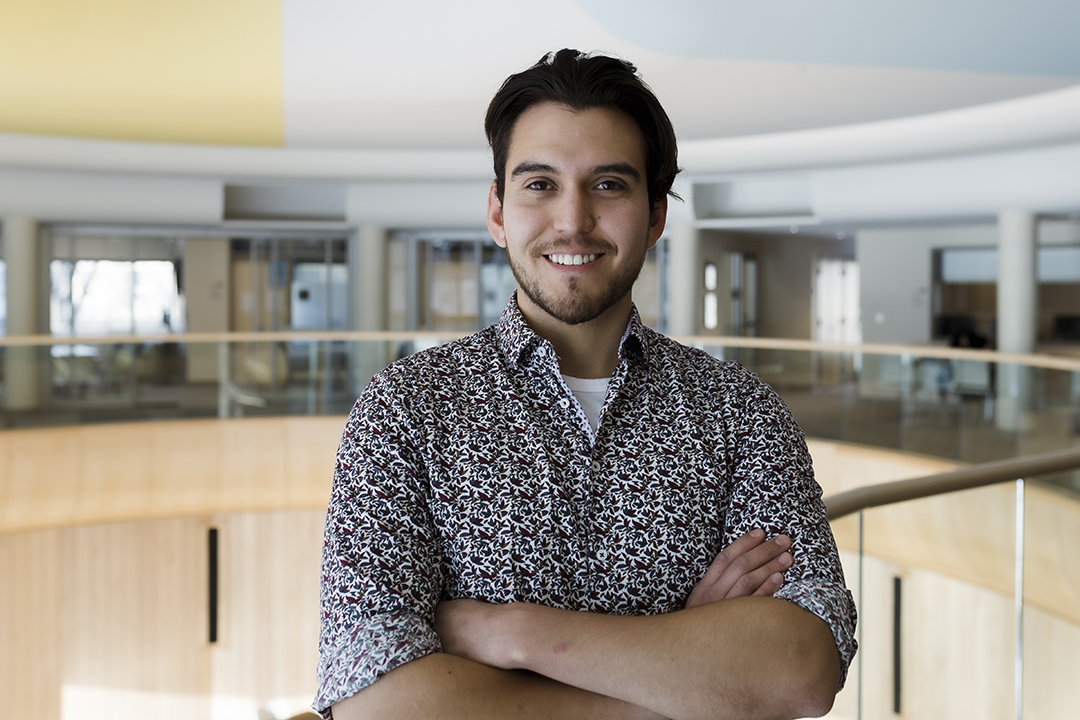
A love for nature inspires USask civil engineering student
Having the ability to be immersed in nature makes work more attractive to Harrison Bull.
By Ashley Sharp and John ShellingBull was born and raised in Saskatoon and is a member of the George Gordon First Nation. He holds a bachelor’s degree in chemical engineering and is currently pursuing a master’s in civil engineering with a research area being water treatment and environmental radiation.
Bull will receive an award for research endeavours at this year’s Indigenous Student Achievement Awards on Feb. 6. Indigenous students from across the University of Saskatchewan (USask) will be honoured at a ceremony to recognize their academic excellence, leadership, research endeavours or community engagement.
The award ceremony is part of Indigenous Achievement Week (IAW), which celebrates the successes and contributions of Métis, First Nations and Inuit students, staff and faculty. The festivities include a public art project, speakers and celebrations in various locations across campus.
We asked Bull a few questions about his time at USask and what motivates him.
How did you choose your research area of water treatment and environmental remediation?
Water is an invaluable component to life as we know it on earth, water truly is life. Combining this truth with the career path of using knowledge and technology to solve pertinent problems with regards to the damage sustained by our biosphere, as well as the University of Saskatchewan's position among institutions that conduct water research, and the choice was fairly straightforward.
How has your love for nature affected your decision to pursue your chosen course of study?
I'd be lying if I didn't mention that the ability to go out into the field and hear birdsong and smell the rain while doing my research is a very attractive way to work. I do a lot of camping, so the discomforts of field work are pretty minor. The chance to be in nature, doing work to help protect nature and people, is a wonderful thing.
What advice would you give to a first-year Indigenous student interested in engineering?
It would depend on their circumstances. I have seen a lot of people get pushed into the STEM fields by teachers and parents that want good things for their children, or the opportunity to brag about their success. At the end of the day, a lot of people that are told to do this sort of work drop out or end up pursuing other work after graduation because they don't feel the personal connection to the work or enjoy aspects of the profession. If you're in engineering because someone else wants you there, and that person isn't in class with you and looking over your shoulder, you're going to hit a point where either you find your own motivation or you don't succeed. And whether that point is in first year or three years post-graduation, it’s hard to say. Sustainability isn't a practice that is ever truly finished in design, and that includes the human factors of your life. Maybe you can handle the course load for a four-year graduation for a few years, but if it takes you longer or you start later in life than out of high school that is much more of a success than almost graduating and burning out. Be a sustainable student. Have a sustainable career.
Has there been someone in your life who has inspired you to get to where you are today?
There are pieces of me made from so many places, but my father being a scientist himself really helps make the abstract concrete.
This year’s IAW theme is Indigenous knowledge systems. How can Indigenous knowledge systems improve the world we live in?
There is no endless growth on a finite space. We depend on the earth and natural systems for so much of our lives and it is becoming clear that in the community of earth we will stand together or face the consequences together. Stewardship, right knowledge and community are the path to our future.

